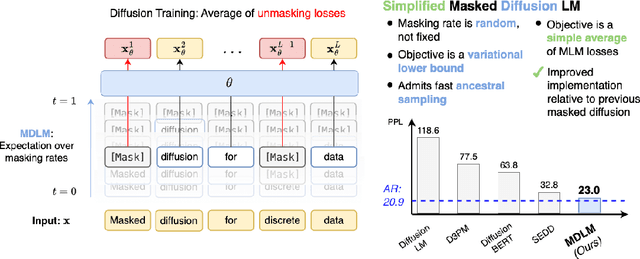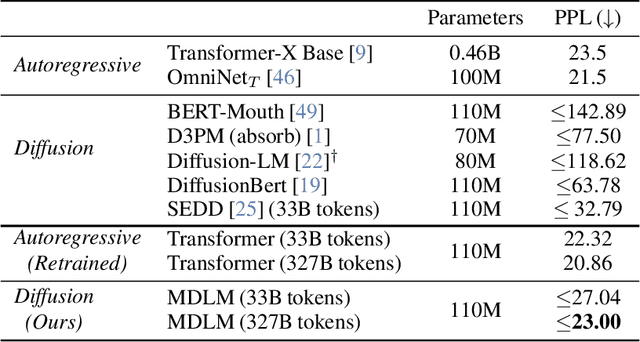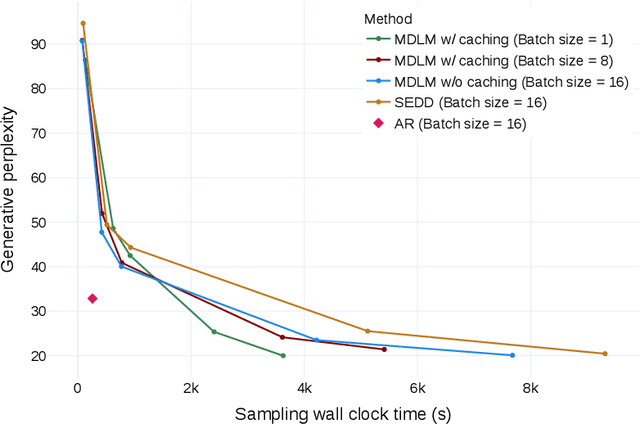Justin T Chiu
Block Diffusion: Interpolating Between Autoregressive and Diffusion Language Models
Mar 12, 2025Abstract:Diffusion language models offer unique benefits over autoregressive models due to their potential for parallelized generation and controllability, yet they lag in likelihood modeling and are limited to fixed-length generation. In this work, we introduce a class of block diffusion language models that interpolate between discrete denoising diffusion and autoregressive models. Block diffusion overcomes key limitations of both approaches by supporting flexible-length generation and improving inference efficiency with KV caching and parallel token sampling. We propose a recipe for building effective block diffusion models that includes an efficient training algorithm, estimators of gradient variance, and data-driven noise schedules to minimize the variance. Block diffusion sets a new state-of-the-art performance among diffusion models on language modeling benchmarks and enables generation of arbitrary-length sequences. We provide the code, along with the model weights and blog post on the project page: https://m-arriola.com/bd3lms/
Commit0: Library Generation from Scratch
Dec 02, 2024Abstract:With the goal of benchmarking generative systems beyond expert software development ability, we introduce Commit0, a benchmark that challenges AI agents to write libraries from scratch. Agents are provided with a specification document outlining the library's API as well as a suite of interactive unit tests, with the goal of producing an implementation of this API accordingly. The implementation is validated through running these unit tests. As a benchmark, Commit0 is designed to move beyond static one-shot code generation towards agents that must process long-form natural language specifications, adapt to multi-stage feedback, and generate code with complex dependencies. Commit0 also offers an interactive environment where models receive static analysis and execution feedback on the code they generate. Our experiments demonstrate that while current agents can pass some unit tests, none can yet fully reproduce full libraries. Results also show that interactive feedback is quite useful for models to generate code that passes more unit tests, validating the benchmarks that facilitate its use.
Simple and Effective Masked Diffusion Language Models
Jun 11, 2024



Abstract:While diffusion models excel at generating high-quality images, prior work reports a significant performance gap between diffusion and autoregressive (AR) methods in language modeling. In this work, we show that simple masked discrete diffusion is more performant than previously thought. We apply an effective training recipe that improves the performance of masked diffusion models and derive a simplified, Rao-Blackwellized objective that results in additional improvements. Our objective has a simple form -- it is a mixture of classical masked language modeling losses -- and can be used to train encoder-only language models that admit efficient samplers, including ones that can generate arbitrary lengths of text semi-autoregressively like a traditional language model. On language modeling benchmarks, a range of masked diffusion models trained with modern engineering practices achieves a new state-of-the-art among diffusion models, and approaches AR perplexity. We release our code at: https://github.com/kuleshov-group/mdlm
On What Basis? Predicting Text Preference Via Structured Comparative Reasoning
Nov 14, 2023



Abstract:Comparative reasoning plays a crucial role in text preference prediction; however, large language models (LLMs) often demonstrate inconsistencies in their reasoning. While approaches like Chain-of-Thought improve accuracy in many other settings, they struggle to consistently distinguish the similarities and differences of complex texts. We introduce SC, a prompting approach that predicts text preferences by generating structured intermediate comparisons. SC begins by proposing aspects of comparison, followed by generating textual comparisons under each aspect. We select consistent comparisons with a pairwise consistency comparator that ensures each aspect's comparisons clearly distinguish differences between texts, significantly reducing hallucination and improving consistency. Our comprehensive evaluations across various NLP tasks, including summarization, retrieval, and automatic rating, demonstrate that SC equips LLMs to achieve state-of-the-art performance in text preference prediction.
UNcommonsense Reasoning: Abductive Reasoning about Uncommon Situations
Nov 14, 2023Abstract:Language technologies that accurately model the dynamics of events must perform commonsense reasoning. Existing work evaluating commonsense reasoning focuses on making inferences about common, everyday situations. To instead investigate the ability to model unusual, unexpected, and unlikely situations, we explore the task of uncommonsense abductive reasoning. Given a piece of context with an unexpected outcome, this task requires reasoning abductively to generate a natural language explanation that makes the unexpected outcome more likely in the context. To this end, we curate and release a new English language corpus called UNcommonsense. We characterize the differences between the performance of human explainers and the best performing large language models, finding that model-enhanced human-written explanations achieve the highest quality by trading off between specificity and diversity. Finally, we experiment with several online imitation learning algorithms to train open and accessible language models on this task. When compared with the vanilla supervised fine-tuning approach, these methods consistently reduce lose rates on both common and uncommonsense abductive reasoning judged by human evaluators.
 Add to Chrome
Add to Chrome Add to Firefox
Add to Firefox Add to Edge
Add to Edge